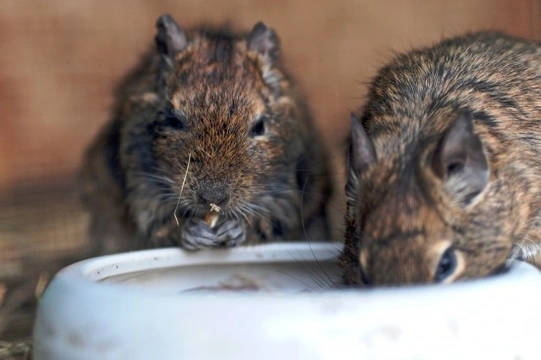
How to prepare for adopting a degu
While not the most popular of small animals in the UK, Degus are interesting little rodents and can give owners a great deal of joy. They have a distinctive look when placed against other rodents, their bodies are fairly short and their noses do not stick out as far as rats or mice. They can be tamed if handled from an early age, and enjoy the social interaction of other degus or humans.
Another interesting fact that sets them apart from a lot of other rodents - they are diurnal. This means they are awake during the day, not at night like other rodents. This is a lot more convenient for most owners, meaning no distracting scratching and chewing noises throughout the night keeping you awake.
The average lifespan of a degu is 6-8 years, so adopting one is a long term commitment. Invest in a good cage and anything else you need in the beginning. Having a stable environment over the duration of their life is important to them.
If you have decided to adopt a degu you will find them for sale on our site. Before adopting any pet you need to prepare a home and understand their requirements before bringing one home. So, in this article we will explain everything you need to know to get you started with owning a degu, and ensuring they are happy and healthy.
Feeding
Degus have a similar diet to guinea pigs and chinchillas. As such, you will probably not find food designed specifically for degus. However, it is fine to feed them chinchilla or guinea pig pellets, along with rodent blocks to add some variation to their diet. The combination of pellets and blocks help provide the majority of the nutritional values they require.
You should make grass hay available to them at all times. You can attach a hay tray to their cage to make this easier, similar to what you would find on a rabbit cage. They also enjoy alfalfa hay, this is rich in fibre and helps their digestion. It’s optional, but providing some in their cage is a plus.
When you feel like giving degus something different there are a range of fresh vegetables and fruits they enjoy. Sweet potato, broccoli, carrots, dandelion leaves and green beans are all examples of foods they enjoy. Give them all of these in small quantities to avoid any upset stomachs, if you do notice any problems cease providing the foods immediately.
Cage
Degus require a larger cage that other rodents. The recommended space for a couple of degus is at least 24” by 18”, and 24” tall. But the larger the better, and a couple of ledges inside is a big plus too. Cages made of wire will hold up well, degus love to chew on whatever they can get their teeth around, but wire will survive their chewing attempts.
Degus are known to suffer from problems with their feet, especially if they get them caught in tight spaces. So solid wood accessories and shelves in their cage is the safest option, they can spring off these surfaces safely.
Their cage will need to be cleaned out every 7-10 days. Replace all the bedding and nesting materials and wipe down any surfaces in the cage.
Bedding and nesting
Avoid cedar and pine shaving, like with any small pet they are harmful to the respiratory systems. Layer the bottom of their cage with some absorbent, pet-safe bedding. You’ll need to change this once a week, so don’t go overboard.
Degus love having a small personal space to nest in. A small pet house will do just fine, fill it with good quality nesting material like shredded paper, or hay. You will notice they spend a decent amount of time either inside having a sleep, or standing/sitting on top of the house.
Other cage items
Daily exercise is an important part of a degus’ routine. So an exercise wheel is a must, these are easily purchased and fitted to any cage. If you are feeling a little bit creative you can add some branches to their cage. Not only does this give them the opportunity to jump from branch to branch, but they chew on them too.
Chew proof feeding bowls are recommended if you want them to last, ceramic or metal options are available. Think ropes can be used to provide something to chew on and play with too, they should last a long time. Also, make sure the water bottle only has the metal end poking into the cage.
Degus need company
In their natural habitat in the wild degus live in large groups. They communicate among one another with a wide range of noises and sounds. Unless you have a really big cage, owning two degus of the same sex is the best option. Having a cage mate gives each of them plenty of social interaction each day, and fighting should not be a problem, degus tend to be fairly passive animals.
If you are seeing some signs of fighting and injury between your degus, you’ll need to take action to separate them. But generally speaking a couple of males, or a female and a neutered male will get along just fine.
In summary
If you have made your mind up that you want to own degus, and after reading all of the above you are certain you can accommodate them – go ahead and start looking for a pair. They make great pets, are fun to play with, and easy to look after.
Unlike most small pets and other rodents they sleep at night, and are awake during the day. This makes them a lot more convenient around most people life styles. I’m sure degus will bring you a lot of joy and owner satisfaction over the years, if you require any further information there are more articles to browse in the rodent care section here.



